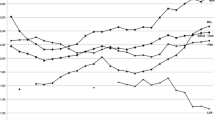Abstract
The excellence program in Germany (financed by the federation and the states) is expected to enhance the international competitiveness of science and research in German universities. This purpose is, however, being undermined by the fact that a homology of cartel, monopoly and oligarchy structures has emerged that implies an enormous distortion of competition and leads to the inefficient allocation of resources among institutions. This inefficiency is revealed by the discrepancy between the input of resources in absolute and in relative terms per personnel and between the input of resources and the output of publications, both in absolute and relative terms. Because the excellence program allocates resources according to the dominant pattern of cartel, monopoly and oligarchy, it will even strengthen the inefficient allocation of resources for research. Therefore it will not improve the international competitiveness of science and research in Germany but rather contribute to its further decline.
Similar content being viewed by others
Literatur
Berghoff, Sonja, Gero Federkeil, Petra Giebisch, Cort-Denis Hachmeister, Meike Siekermann und Detlef Müller-Böling, 2005a: Das CHE-ForschungsRanking 2004. Auszug aus dem Arbeitspapier Nr. 62, Gütersloh.
Berghoff, Sonja, Gero Federkeil, Petra Giebisch, Cort-Denis Hachmeister und Detlef Müller-Böling, 2005b: Das CHE-ForschungsRanking deutscher Universitäten 2005. Arbeitspapier Nr. 70, Gütersloh.
BLK, Bund-Länder-Kommission für Bildungsplanung und Forschungsförderung (Hrsg.), 1999: Bericht der internationalen Kommission zur Systemevaluation der DFG und der MPG. http://www.blk-bonn.de/papers/forschungsfoerderung.pdf.
Bourdieu, Pierre, 1992: Homo Academicus, Frankfurt a.M.
Deutsche Forschungsgemeinschaft (DFG), 1998: Jahresbericht 1997, Bonn.
Deutsche Forschungsgemeinschaft (DFG), 2003: Förder-Ranking 2003. Institutionen — Regionen — Netzwerke. DFG-Bewilligungen und weitere Basisdaten öffentlich geförderter Forschung, Bonn.
Greiff, Bodo von, 1991: Diogenes falsch verstanden: Tonnenideologie an der Universität, in: Leviathan 19(2), S. 166–174.
Hartmann, Michael, 2006: Die Exzellenzinitiative — ein Paradigmenwechsel der deutschen Hochschulpolitik, in: Leviathan 34(4).
Hornbostel, Stefan, 1997: Wissenschaftsindikatoren. Bewertungen in der Wissenschaft, Opladen.
Hornbostel, Stefan, 2001: Die Hochschulen auf dem Weg in die Audit Society. Über Forschung, Drittmittel, Wettbewerb und Transparenz, in: E. Stölting und U. Schimank (Hrsg.), Die Krise der Universitäten (= Leviathan Sonderheft 20), Wiesbaden. S. 139–158.
Meyer, John und Brian Rowan, 1977: Institutionalized Organizations: Formal Structure as Myth and Ceremony, in: American Journal of Sociology 83, S. 55–77.
Michels, Robert, 1989: Zur Soziologie des Parteiwesens in der modernen Demokratie, Stuttgart.
Moed, Henk F, 2005: Citation Analysis in Research Evaluation, Dordrecht.
Mogge-Stubbe, Birgitta, 2006: Lasst Unis leuchten!, in: Rheinischer Merkur 61(4), 26. Januar, S. 1.
Münch, Richard, 2007: Die akademische Elite. Zur sozialen Konstruktion wissenschaftlicher Exzellenz, Frankfurt a.M.
Neidhardt, Friedhelm, 1988: Selbststeuerung in der Forschungsförderung: Das Gutachterwesen der DFG, Opladen.
Pierson, Paul, 2004: Politics in Time: History, Institutions, and Social Analysis, Princeton.
Schimank, Uwe, 1995: Hochschulforschung im Schatten der Lehre, Frankfurt a.M./New York.
Teichler, Ulrich, 2005: Hochschulstrukturen im Umbruch. Eine Bilanz der Reformdynamik seit vier Jahrzehnten, Frankfurt a.M./New York.
Winnes, Markus und Uwe Schimank, 1999: National Report: Federal Republic of Germany. TSER Project No. SOE1-CT96-1036. European Comparison of Public Research Systems. Max Planck Institute for the Study of Societies, Mai.
ZEIT, DIE, 2003. „Wer hat dem wird gegeben. Ernst Ludwig Winnacker will mehr Wettbewerb und eine stärkere Spezialisierung der Hochschulen.“ http://hermes.zeit.de
Additional information
Ich danke Christian Dressel für die Durchführung der Regressionsanalysen; Eva Passarge danke ich für die Anfertigung der Punktdiagramme.
About this article
Cite this article
Münch, R. Wissenschaft im Schatten von Kartell, Monopol und Oligarchie. Die latenten Effekte der Exzellenzinitiative. Leviathan 34, 466–486 (2006). https://doi.org/10.1007/s11578-006-0065-0
Issue Date:
DOI: https://doi.org/10.1007/s11578-006-0065-0




